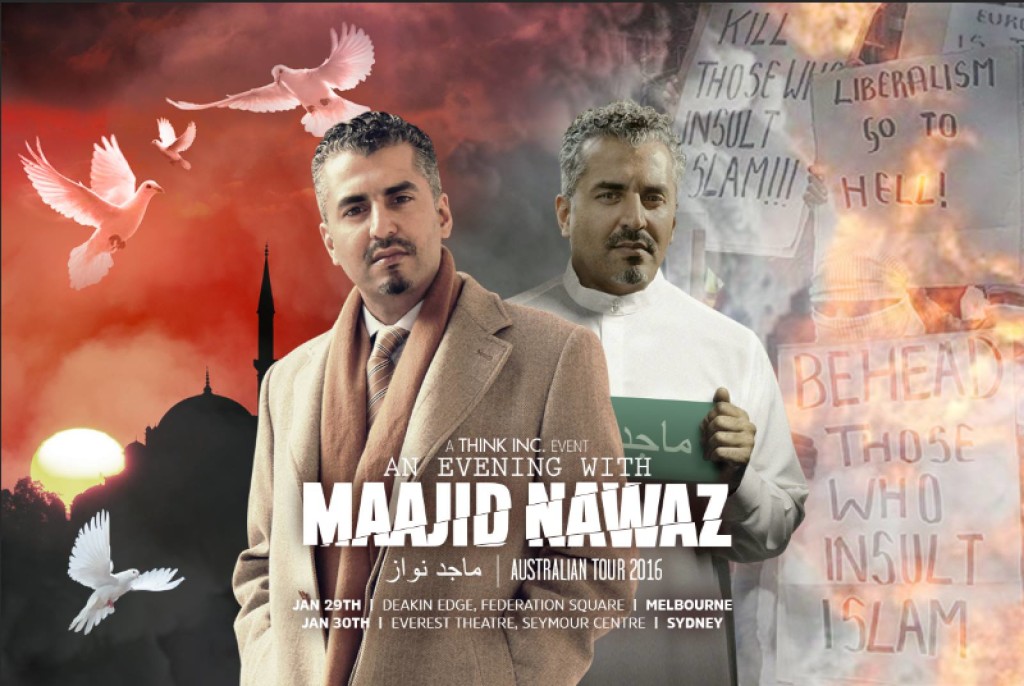“If liberalism is to mean anything at all, it is duty bound to support without hesitation the dissenting individual over the group, the heretic over the orthodox, innovation over stagnation, and free speech over offense.”
 A recurring global conversation of 2015 has been one centered on extremism. The widely reported Charlie Hebdo killings in January and the recent string of November attacks across Paris have thrust sociopolitical discourse deeper than ever into territory that holds under scrutiny the place that democracy, religion, and identity have in the globalised world. One of the voices proactively calling for a fair and rigorous assessment of tolerance in the 21st century is being brought to Australia in January 2016: author, politician and activist Maajid Nawaz.
A recurring global conversation of 2015 has been one centered on extremism. The widely reported Charlie Hebdo killings in January and the recent string of November attacks across Paris have thrust sociopolitical discourse deeper than ever into territory that holds under scrutiny the place that democracy, religion, and identity have in the globalised world. One of the voices proactively calling for a fair and rigorous assessment of tolerance in the 21st century is being brought to Australia in January 2016: author, politician and activist Maajid Nawaz.
An ex-radical Islamist himself, Nawaz has since redirected his efforts towards proactively critiquing the dangers of religious fundamentalism in the 21st century, penning the 2012 confessional ‘Radical: My Journey out of Islamist Extremism’ and continuing to be a positive force in the mammoth discussion on curtailing religious intolerance from both theists and nontheists, promoting the need for greater secularity within religion and society altogether.
Founding the Quilliam Foundation in 2008, “the world’s first counter-extremism think tank set up to address the unique challenges of citizenship, identity, and belonging in a globalised world”, Nawaz has been a proponent for social change and the acknowledgement of the dangerous result at the nexus of social discrimination, identity crises and religious ideology.
Quilliam’s focal points traverse our most pressing questions: What are the seemingly countless and complex contributing risk factors for youths joining extremist groups? At which fault are the parties involved? How can these parties form alliances to efficiently combat extremist activity that claims lives by the thousands?
In his most recent book ‘Islam and the Future of Tolerance’, co-authored with celebrated ‘new atheist’ Sam Harris, both Nawaz and Harris point the finger both at those who contribute socio-economically and socio-politically to the growing trend of youths joining extremist groups, and at the ‘regressive left’: liberal apologists that refuse to acknowledge the existence of Islamist extremism. Nawaz draws on the beloved Harry Potter mythos to describe the ‘regressive left’ as victim to what he calls ‘The Voldemort Effect’: a fear to acknowledge, let alone name, an evident danger for what it is.
Think Inc. – the team behind the Australian tours of Sam Harris, Dr Neil deGrasse Tyson, Dr Michio Kaku, Dr Cornel West and The ‘Amazing’ James Randi – are pleased to present An Evening with Maajid Nawaz in late January of 2016. Off the heels of his special guest appearances at An Evening with Sam Harris, Maajid Nawaz will engage Sydney and Melbourne audiences in the discussion of approaching these crucial conversations with critique, candour and courage.
Melbourne
When: 6pm on Friday 29 January
Where: Deakin Edge, Federation Square
Tickets: via Think Inc.
Sydney
When: 6.30pm on Saturday 30 January
Where: Seymour Centre, Sydney
Tickets: via the Seymour Centre

